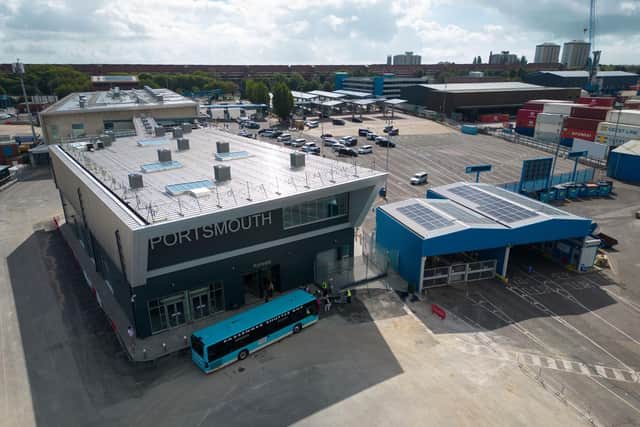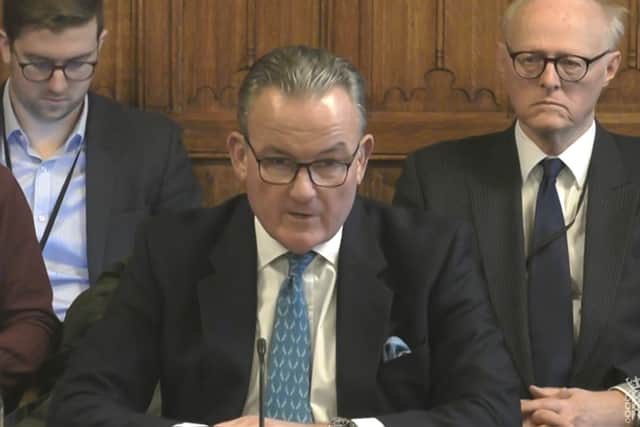Portsmouth port: Check finds wildlife "infestation" and faulty x-rays which "failed" to find illegal migrants
and live on Freeview channel 276
The Home Office released 12 reports carried out under the tenure of David Neal, the former independent chief inspector of borders and immigration, last night. Mr Neal was sacked by the home secretary, James Cleverly, last week.
Among the documents was one detailing an inspection carried out at Portsmouth International Port on August 29, 2023 - with recommendations being sent to then home secretary Suella Braverman on September 6, 2023. The report, which monitored border force operations and examined the site, found “committed, enthusiastic and actively engaged” staff were operating at the seaport, but concerns were raised about the facilities and other matters.
Advertisement
Hide AdAdvertisement
Hide Ad

The Border Force installed a mobile "backscatter" x-ray system at the site during Operation Amanita, which examined all types of freight to find "clandestine entrants", the report said. "Inspectors were told that knowledge of the policy of scanning all accompanied freight had led to a significant drop in the number of clandestine migrants attempting to hide in lorries," it added. Despite this, the report said there were instances where X-ray technology "failed" to locate illegal migrants who were later found in lorries.
Primary control booths (PCP, commonly known as passport control) where passengers drive into the port were found to be "dated" and in "poor" condition, the report said. Lighting around vehicles at the booths was described as “terrible” by officers, making it harder for them to conduct face-to-face checks. “The booths did not have a positive air pressure system to prevent vehicle fumes from entering them, and the ventilation system designed to remove vehicle fumes was not working in any of the booths," the report said. "Staff told inspectors that it was not possible to regulate the temperature adequately, leading to uncomfortable working conditions.”
The spot check also discovered areas which were overrun with wildlife. "The customs examination area beyond the PCP lanes were also in poor condition," the report said. "Inspectors noted the presence of a large amount of pigeon excrement around the perimeter and the absence of any system to prevent the nesting of wildlife. In contrast, the processing of foot and coach passengers was housed in a modern building. Modern holding rooms with interview facilities, with a 'well-presented International Trade office'". It added: "Inspectors observed an infestation problem in the customs area to the detriment of Border Force operations and arriving passengers."


Government funding has been granted to the port, with £11.25m of levelling up funding being used to build carbon-neutral passenger terminal. A Portsmouth International Port spokesman said they support the border force "in their role to provide security at the UK border." He added: "The report notes the strong working relationship between the port and local Border Force teams, and also recognises the excellent facilities on offer within our terminal. The customs examinations area has measures in place to deter wildlife, along with a regular, extensive schedule for cleaning the facility. The port and local Border Force officials continue to have a collaborative approach to all activities, including planning future improvements to border infrastructure.”
Advertisement
Hide AdAdvertisement
Hide AdThe report concluded that the port's facilities were a "mixed bag". and improvements would make a better experience for border force staff. One port representative, mentioned in the report, told inspectors that the Home Office “does not properly consider the local impact of national directives nor communicates these in a timely manner”.
The Home Office said: “We are pleased that the inspection found a culture of strong management and leadership, that staff were committed and enthusiastic in conducting their duties to strive towards keeping the UK border secure, and the strong working relationship with stakeholders at the port. We accept that the facilities at Portsmouth are not at the required standard and will continue to work with the port operator to address the issues raised."
Comment Guidelines
National World encourages reader discussion on our stories. User feedback, insights and back-and-forth exchanges add a rich layer of context to reporting. Please review our Community Guidelines before commenting.